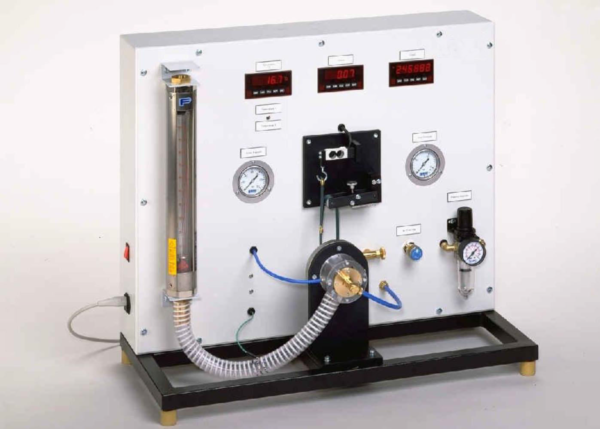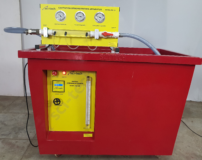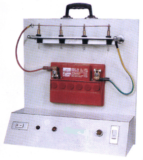RADIAL FLOW TURBINE Model FM 24
Home » Products » RADIAL FLOW TURBINE Model FM 24
RADIAL FLOW TURBINE Model FM 24
Sci-tech Radial Flow Turbine Model FM 24 includes a turbine rotor fitted with four nozzle-shaped exits. The rotor is mounted in a transparent housing. The air flows through the exit nozzles of the turbine rotor, expands and accelerates. The exiting air jet drives the turbine rotor according to the reaction principle. The load unit to determine the torque is placed outside of the housing.
Pressures at turbine inlet and turbine outlet are indicated on manometers. The torque is determined by force measurement on a band brake. The speed is measured with an optical speed sensor. Torque, speed and temperatures are digitally displayed. The volumetric air flow rate is read off a rotameter.
The turbine is fitted with a quick-action stop valve as safety device in case of over-speed. The brake drum is air-cooled.
The well-structured instructional material sets out the fundamentals and provides a step-by-step guide through the experiments.
| Size: | 80cm x 60cm x 80cm (LxWxH) |
| Weight: | 45 kg |
Item Description
Features
* Characteristic behavior of a reaction turbine through which air flows1
* Compressed air operated, closed experimental set-up
The conversion of pressure energy into kinetic energy in the rotor is characteristic for reaction or radial flow turbines. In a reaction or radial flow turbine, the static pressure of the working medium in front of the rotor is higher than behind it. In this case here, the working medium is air. The experimental unit allows us to understand analogies to turbines driven by steam or water.
Sci-tech Radial Flow Turbine Model FM 24 includes a turbine rotor fitted with four nozzle-shaped exits. The rotor is mounted in a transparent housing. The air flows through the exit nozzles of the turbine rotor, expands and accelerates. The exiting air jet drives the turbine rotor according to the reaction principle. The load unit to determine the torque is placed outside of the housing.
Pressures at turbine inlet and turbine outlet are indicated on manometers. The torque is determined by force measurement on a band brake. The speed is measured with an optical speed sensor. Torque, speed and temperatures are digitally displayed. The volumetric air flow rate is read off a rotameter.
The turbine is fitted with a quick-action stop valve as safety device in case of over-speed. The brake drum is air-cooled.
The well-structured instructional material sets out the fundamentals and provides a step-by-step guide through the experiments.




